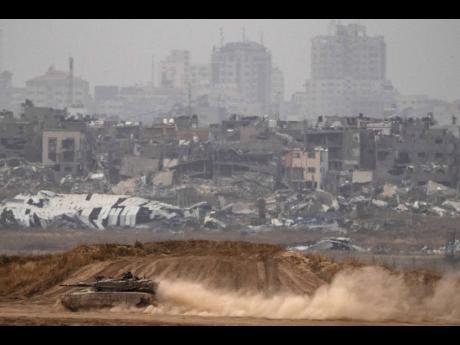Editorial | Recognising Palestine
Jamaica’s formal recognition this week of Palestine as a sovereign and independent state is a profoundly moral decision that places the island on the right side of history.
Notably, Jamaica became the 140th of the 193 members of the United Nations to formally recognise the State of Palestine, and its action followed, by less than a week, a similar move by Barbados.
A dozen of the 14 independent members of the Caribbean Community (CARICOM) have now taken this action, with the outliers being Trinidad and Tobago and The Bahamas. CARICOM’s other full member, the eastern Caribbean island of Montserrat, is an overseas territory of Britain, which has responsibility for its foreign policy. Montserrat, therefore, can’t independently recognise the State of Palestine.
The timing of Jamaica’s move is important in two other ways. It will help to ease the suspicion of recent years that Jamaica, under the Holness administration, had grown less committed to the Palestinian cause, as Kingston pursued closer security and other relations with Benjamin Netanyahu’s Israel. Second – an issue that overlaps with the first – it will be interpreted as an attempt create strategic distance with the United States on the Palestinian question after Washington’s last week vetoed a Security Council resolution to the accept the State of Palestine as a full member of the United Nations, of a which it is now a “non-member observer state”.
To be clear, good relations with Israel, believing in its right to exist within secure borders – those that existed before the 1967 war – and championing Palestinian statehood are not, and shouldn’t be considered, mutually exclusive.
TWO PROFOUND PRINCIPLES
Indeed, as the foreign minister, Kamina Johnson Smith observed, Jamaica’s decision to recognise Palestine stands on two profound principles enshrined in the UN’s charter: mutual respect and peaceful coexistence between states and the recognition of a people’s right to self-determination.
And nor can it be argued with credibility, or moral force, as the United States and Israel have attempted to do, that recognition of an independent Palestinian state can only be possible within the context of a signed and sealed irrevocable delimitation agreement between the Israelis and Palestinians.
“Right now, the Palestinians don’t have control over a significant portion of what is supposed to be their state. It’s being controlled by a terrorist organisation,” said Linda Thomas-Greenfield, America’s ambassador to the United Nations, referencing Hamas’ control of Gaza, at least up to the time of outbreak of the current war.
If that logic were applied at the time of Israel’s creation, the Jewish state probably wouldn’t exist today. At the time of the UN’s November 1947 vote approving the partition of Palestine, Arabs didn’t accept the premise upon which the partition was being done or the boundaries that were proposed for the two states that were to come into existence. The majority of the then members of the UN voted in favour of partition (33 yes; 13 no; 10 abstentions), and rejected the position of those who argued for a single entity, because they believed that there was a moral case, intensified by the Holocaust, for a Jewish homeland in Palestine. Indeed, by the time of Israel’s official founding in 1948, its boundaries had expanded beyond what was set by the UN’s partition commission.
WITHDRAWAL FROM TERRITORIES
Further, Security Council resolution 242 of 1967 called for Israeli withdrawal from territories, including East Jerusalem, Gaza and Sinai, captured in the Six Day War. The point is, the UN recognises Palestine’s legitimate borders. Whether the Palestinians control those territories now, or if they wish to negotiate them away in the future, doesn’t derogate from their right to self-determination. Nor does the internal differences and conflicts between Palestinian political actors, such those in the past between Fatah and Hamas, negate the legitimacy of their cause.
By its current stance Jamaica may achieve a reset of negative perceptions of its attitude towards the Israeli-Palestinian question, exacerbated most recently by its still inadequately explained absence at the first General Assembly ceasefire vote on Gaza, and its 2017 abstention in the vote on the resolution rejecting Israel’s declaration of Jerusalem, whose status is to be settled by negotiation, as its capital.
Fundamentally, formal recognition of the state of Palestine merely gives expression to a position on which Jamaica is in concert with the majority of the world’s nations: the two-state solution to the Palestinian-Israeli conflict.
“By recognising the state of Palestine, Jamaica strengthens its advocacy towards a peaceful solution,” Ms Johnson Smith said. We agree.
Hopefully, Israel hears that message, and calls for it to end its carnage in Gaza, not with a sense of isolation and victimhood, but as a collective moral voice of reason. The remaining CARICOM outliers on Palestinian recognition should now come to the centre.

